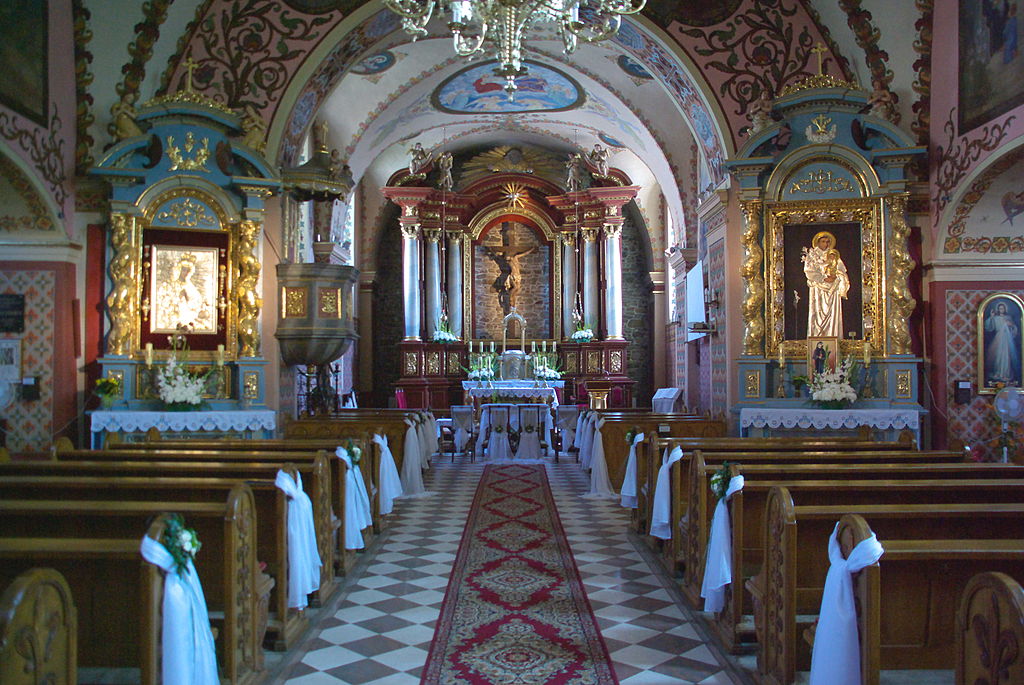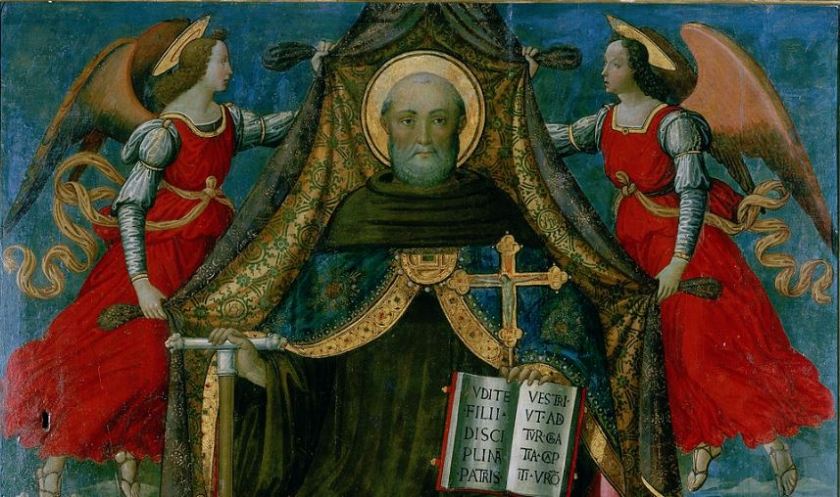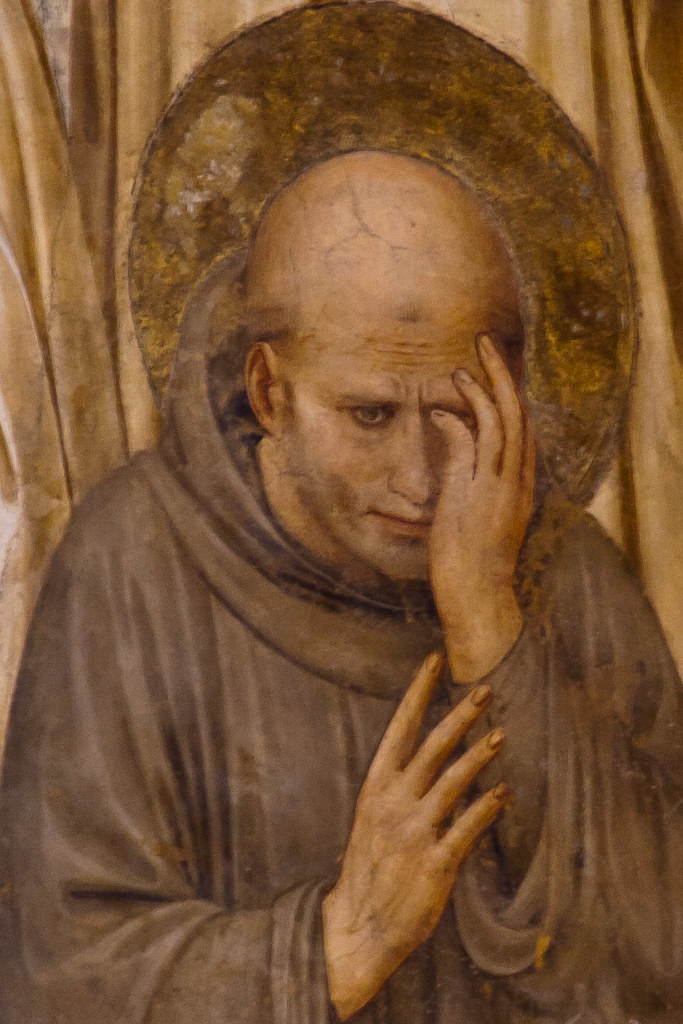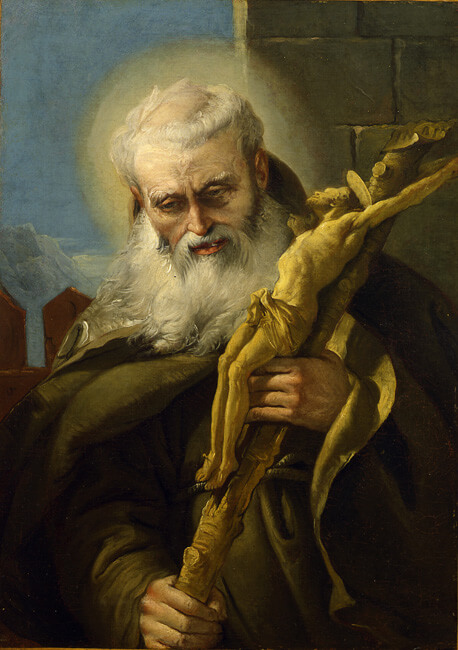Matthew CHAP. 10
10:34–36
34. Think not that I am come to send peace on earth: I came not to send peace, but a sword.
35. For I am come to set a man at variance against his father, and the daughter against her. mother, and the daughter in law against her mother in law.
36. And a man’s foes shall be they of his own household.
JEROME. He had before said, What I say to you in darkness, that speak ye in the light; He now tells them what will follow upon that preaching, saying, Think not that I am come to send peace upon earth; I am not come to send peace, but a sword.
GLOSS. (interlin.) Or connect it with what has gone before, As the fear of death ought not to draw you away, so neither ought carnal affection.
CHRYSOSTOM. (Hom. xxxv.) How then did He enjoin them, that when they should entor any house they should say, Peace be to this house, as also the Angels sung, Glory to God in the highest, on earth peace to men. (Luke 2:14.) That is the most perfect peace when that which is diseased is lopped off, when that which introduces strife is taken away, for so only is it possible that heaven should be joined to earth. For so does the physician save the rest of the body, namely by cutting off that which cannot be healed. So it came to pass at the tower of Babel; a happy discord broke up their bad union. So also Paul divided those who were conspired together against him. For concord is not in all cases good; for there is honour among thieves. And this combat is not of His setting before them, but of the plots of the world.
JEROME. For in the matter of belief in Christ, the whole world was divided against itself; each house had its believers and its unbelievers; and therefore was this holy war sent, that an unholy peace might be broken through.
CHRYSOSTOM. This He said as it were comforting His disciples, as much as to say, Be not troubled as though these things fell upon you unexpectedly; for, for this cause I came that I might send war upon the earth—nay He says not ‘war,’ but what is yet harder, a sword. For He sought by sharpness of speech so to rouse their attention, that they should not fall off in time of trial and difficulty, or say that He had told them smooth things, and had hid the difficulties. For it is better to meet with softness in deeds than in words; and therefore He stayed not in words, but shewing them the nature of their warfare, He taught them that it was more perilous than a civil war; saying, I am come to set a man against his father, and daughter against her mother, and daughter-in-law against her mother-in-law. So this warfare will be between not acquaintances merely, but the nearest and dearest kindred; and this shews Christ’s very great power; that His disciples after having heard this, yet undertook the mission, and brought over others. Yet was it not Christ who made this division, but the evil nature of the parties; when He says that it is He that does it, He speaks according to the manner of Scripture. As it is written, God hath given them eyes that they should not see. (Is. 6:10.) Here is also a great proof that the Old Testament is like the New. For among the Jews a man was to put his neighbour to death if he found him making a calf, or sacrificing to Baalphegor; so here to shew that it was the same God who ordained both that and these precepts, He reminds them of the prophecy, A man’s foes are they of his household. For this same thing happened among the Jews; there were Prophets, and false Prophets; there the multitude was divided, and houses were set against themselves; there some believed one part, and some another.
JEROME. These are almost the words of the Prophet Micah. (Mic. 7:6.) We should always take note when a passage is cited out of the Old Testament, whether the sense only, or the very words are given.
HILARY. Mystically; A sword is the sharpest of all weapons, and thence it is the emblem of the right of authority, the impartiality of justice, the correction of offenders. The word of God, we may remember, is likened to a sword; (Eph. 6:17. Heb. 4:12.) so here the sword that is sent upon the earth is His preaching poured into the heart of man. The five inhabiting one house, whom He divides three against two, and two against three, we may explain thus; The three are the three parts of man, the body, the soul, and the will; for as the soul is bestowed in the body, so the will has power of using both in any way it chooses; and thence when a law is given it is given to the will. But this is only found in those who were first formed by God. By the sin and unbelief of the first parent, all the generations of men since have had sin for the father of their body, and unbelief for the mother of their soul. And as each man has his will within him, there are thus five in one house. When then we are renewed in the laver of baptism, by virtue of the word we are set apart from our original guilt, and severed, as it were, by the sword of God, from the lusts of this our father and mother, and thus there is great discord made in one house; the new man finding his foes within, he seeks with joy to live in newness of spirit; they which are derived from the old stock, lust to remain in their old pleasures.
AUGUSTINE. (Quæst. in Matt. q. 3.) Otherwise; I am come to set a man against his father; for he renounces the Devil, who was his son; the daughter against her mother, that is, the people of God against the city of the world, that is, the wicked society of mankind, which is spoken of in Scripture under the names of Babylon, Egypt, Sodom, and other names. The daughter-in-law against her mother-in-law, that is, the Church against the Synagogue, which according to the flesh, brought forth Christ the spouse of the Church. They are severed by the sword of the Spirit, which is the word of God. And a man’s foes are they of his household, those, that is, with whom he before lived as intimates.
RABANUS. For no other mutual rights can be preserved between those who are at war in their creeds.
GLOSS. (interlin.) Otherwise; He means, I am not come among men to strengthen their carnal affections, but to cut them off with the sword of the Spirit; whence it is rightly added, And a man’s foes are they of his household.
GREGORY. (Mor. iii. 8.) For the subtle enemy when he sees himself driven out of the hearts of the good, seeks out those who most love them, and speaking by the mouth of those who are dearest, endeavours while the heart is penetrated by love, that the sword of conviction may pierce to the inmost bulwarks of virtue.
10:37–39
37. He that loveth father or mother more than me is not worthy of me: and he that loveth son or daughter more than me is not worthy of me.
38. And he that taketh not his cross, and followeth after me, is not worthy of me.
39. He that findeth his life shall lose it: and he that loseth his life for my sake shall find it.
JEROME. Because of what He had said, I am not come to send peace but a sword, &c. that none might suppose that family affection was banished from His religion, He now adds, He that loves father or mother more than me is not worthy of me. So in the Song of Songs we read, Order love in me. (c. 2:4.) For this order is needed in every affection; after God love thy father, thy mother, and thy children; but if a necessity should occur that the love of parents and children comes into competition with the love of God, and where both cannot be preserved, remember that hatred of our kindred becomes then love to God. He forbids not to love parent or child, but adds emphatically, more than me.
HILARY. For they who have esteemed domestic affection of relations higher than God, are unworthy to inherit good things to come.
CHRYSOSTOM. Yet when Paul bids us obey our parents in all things, we are not to marvel; for we are only to obey in such things as are not hurtful to our piety to God. It is holy to render them every other honour, but when they demand more than is due, we ought not to yield. This is likewise agreeable to the Old Testament; in it the Lord commands that all who worshipped idols, should not only be held in abhorrence, but should be stoned. And in Deuteronomy it is said, He who saith to his father and his mother, I know you not; and to his brethren, Ye are strangers; he hath kept thy saying. (Deut. 33:9.)
GLOSS. (non occ.) It seems to happen in many cases that the parents love the children more than the children love the parents; therefore having taught that His love is to be preferred to the love of parents, as in an ascending scale, He next teaches that it is to be preferred to the love of children, saying, And whoso loveth son or daughter more than me is not worthy of me.
RABANUS. He is unworthy of the divine communion who prefers the carnal affection of kindred to the spiritual love of God.
CHRYSOSTOM. Then that those to whom the love of God is preferred should not be offended thereat, He leads them to a higher doctrine. Nothing is nearer to a man than his soul, and yet He enjoins that this should not only be hated, but that a man should be ready to deliver it up to death, and blood; not to death only, but to a violent and most disgraceful death, namely, the death of the cross; therefore it follows, And whoso taketh not up his cross and followeth me, is not worthy of me. He had as yet said nothing to them respecting his own sufferings, but instructs them in the meanwhile in these things, that they may the more readily receive His words concerning His passion.
HILARY. Or; They that are Christ’s have crucified the body with its vices and lusts. (Gal. 5:24.) And he is unworthy of Christ who does not take up His cross, in which we suffer with Him, die with Him, are buried and rise again with Him, and follow his Lord, purposing to live in newness of spirit in this sacrament of the faith.
GREGORY. (Hom. in Ev. xxxii. 3.) The cross is so called from 1torment; and there are two ways in which we bear the Lord’s cross; either when we afflict the flesh by abstinence; or when in compassion for our neighbour we make his afflictions our own. But it should be known that there are some who make a shew of abstinence not for God, but for ostentation; and some there are who shew compassion to their neighbour, not spiritually but carnally, not that they may encourage him in virtue, but rather countenancing him in faults. These indeed seem to bear their cross, but do not follow the Lord; therefore He adds, And followeth me
CHRYSOSTOM. Because these commands seemed burdensome, He proceeds to shew their great use and benefit, saying, He that findeth his life shall lose it. As much as to say, Not only do these things that I have inculcated do no harm, but they are of great advantage to a man; and the contrary thereof shall do him great hurt—and this is His manner every where. He uses those things which men’s affections are set upon as a means of bringing them to their duty. Thus: Why are you loath to contemn your life? Because you love it? For that very reason contemn it, and you will do it the highest service.
REMIGIUS. The life in this place is not to be understood as the substance, (the soul,) but as this present state of being; and the sense is, He who findeth his life, i. e. this present life, he who so loves this light, its joys and pleasures, as to desire that he may always find them; he shall lose that which he wishes always to keep, and prepare his soul for eternal damnation.
RABANUS. Otherwise; He who seeks an immortal life, does not hesitate to lose his life, that is, to offer it to death. But either sense suits equally well with that which follows, And whoso shall lose his life for my sake shall find it.
REMIGIUS. That is, he who in confession of My name in time of persecution despises this temporal world, its joys, and pleasures, shall find eternal salvation for his soul.
HILARY. Thus the gain of life brings death, the loss of life brings salvation; for by the sacrifice of this short life we gain the reward of immortality.
10:40–42
40. He that receiveth you receiveth me, and he that receiveth me receiveth him that sent me.
41. He that receiveth a prophet in the name of a prophet shall receive a prophet’s reward; and he that receiveth a righteous man in the name of a righteous man shall receive a righteous man’s reward.
42. And whosoever shall give to drink unto one of these little ones a cup of cold water only in the name of a disciple, verily I say unto you, he shall in no wise lose his reward.
JEROME. The Lord when He sends forth His disciples to preach, teaches them that dangers are not to be feared, that natural affection is to be postponed to religion—gold He had above taken from them, brass He had shaken out of their purses—hard then surely the condition of the preachers! Whence their living? Whence their food and necessaries? Therefore He tempers the rigour of His precepts by the following promises, that in entertaining the Apostles each believer may consider that he entertains the Lord.
CHRYSOSTOM. Enough had been said above to persuade those who should have to entertain the Apostles. For who would not with all willingness take in to his house men who were so courageous, that they despised all dangers that others might be saved? Above He had threatened punishment to those who should not receive them, He now promises reward to such as should receive them. And first He holds out to those who should entertain them the honour, that in so doing they were entertaining Christ, and even the Father; He who receiveth me, receiveth him that sent me. What honour to be compared to this of receiving the Father and the Son?
HILARY. These words shew that He has a Mediator’s office, and since He came from God, when He is received by us, through Him God is transfused into us; and by this disposition of grace to have received the Apostles is no other than to have received God; for Christ dwells in them, and God in Christ.
CHRYSOSTOM. A further reward also He promises, saying, He who receiveth a prophet in the name of a prophet, shall receive a prophet’s reward. He said not merely, Whoso receiveth a prophet, or a righteous man, but in the name of a prophet, and in the name of a righteous man; that is, not for any greatness in this life, or other temporal account, but because he is a prophet, or a righteous man.
JEROME. Otherwise; To this His exhortation to the disciple to entertain his teacher, there might a secret objection arise among the faithful; then shall we have to support the false prophets, or Judas the traitor. To this end it is that the Lord instructs them in these words, that it is not the person but the office that they should look to; and that the entertainer loses not his reward, though he whom he entertains be unworthy.
CHRYSOSTOM. A prophet’s reward, and a righteous man’s reward, are such rewards as it is fitting he should have who entertains a prophet, or a righteous man: or, such a reward as a prophet or righteous man should have.
GREGORY. (Hom. in Ev. xx. 12.) He says not, a reward from a prophet, or righteous man, but the reward of a prophet or righteous man. For the prophet is perhaps a righteous man, and the less he possesses in this world, the greater confidence has he in speaking in behalf of righteousness. He who hath of this world’s goods, in supporting such a man, makes himself a free partaker in his righteousness, and shall receive the reward of righteousness together with him whom he has aided by supporting him. He is full of the spirit of prophecy, but he lacks bodily sustenance, and if the body be not supported, it is certain that the voice will fail. Whoso then gives a prophet food, gives him strength for speaking, therefore together with the prophet he shall receive the prophet’s reward, when he shews before the face of God what bounty he shewed him.
JEROME. Mystically; He who receives a prophet as a prophet, and understands him speaking of things to come, he shall receive reward of that prophet. The Jews therefore, who understand the prophets carnally, do not receive the prophet’s reward.
REMIGIUS. Some understand by the prophet here, the Lord Jesus Christ, of whom Moses says, A Prophet shall the Lord your God raise up unto you; (Deut. 18:18.) and the same also by the righteous man, because he is beyond comparison righteous. He then who shall receive a prophet or righteous man in the name of the prophet or righteous man, i. e. of Christ, shall receive reward from Him for love of whom he received Him.
JEROME. That none should say, I am poor and therefore cannot be hospitable, He takes away even this plea by the instance of a cup of cold water, given with good will. He says cold water, because in hot, poverty and lack of fuel might be pleaded. And whosoever shall give to drink to one of the least of these a cup of cold water only in the name of a disciple, verily I say unto you, he shall not lose his reward.
REMIGIUS. The least of these, that is, not a prophet, or a righteous man, but one of these least.
GLOSS. (non occ.) Note, that God looks more to the pious mind of the giver, than to the abundance of the thing given.
GLOSS. (ord.) Or, the least are they who have nothing at all in this world, and shall be judges with Christ.
HILARY. Or; Seeing beforehand that there would be many who would only glory in the name of Apostleship, but in their whole life and walk would be unworthy of it, He does not therefore deprive of its reward that service which might be rendered to them in belief of their religious life. For though they were the very least, that is, the greatest of sinners, yet even small offices of mercy shewn them, such as are denoted by the cup of cold water, should not be shewn in vain. For the honour is not done to a man that is a sinner, but to his title of disciple.











